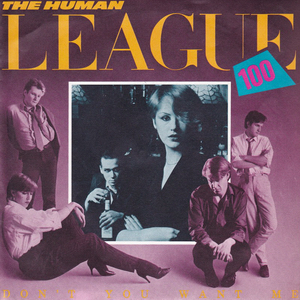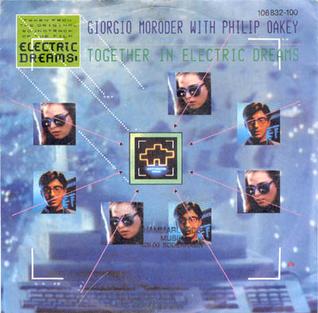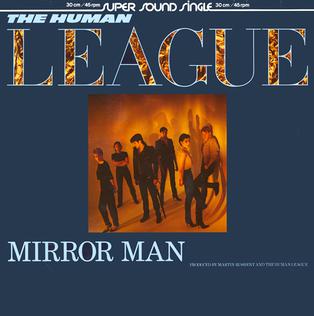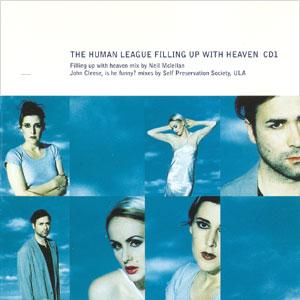
The Human League is an English synth-pop band formed in Sheffield in 1977. Initially an experimental electronic outfit, the group signed to Virgin Records in 1979 and later attained widespread commercial success with their third album Dare in 1981 after restructuring their lineup. The album contained four hit singles, including the UK/US number one hit "Don't You Want Me". The band received the Brit Award for Best British Breakthrough Act in 1982. Further hits followed throughout the 1980s and into the 1990s, including "Mirror Man", "(Keep Feeling) Fascination", "The Lebanon", "Human" and "Tell Me When".

Travelogue is the second full-length studio album released by British synth-pop group The Human League, released in May 1980. It was the last album with founding members Ian Craig Marsh and Martyn Ware, as they would leave to form Heaven 17 later that year.

Philip Oakey is an English singer, songwriter and record producer. He is the lead singer, songwriter, and co-founder of the synth-pop band the Human League. Aside from the Human League, Oakey has enjoyed an extensive solo music career and has collaborated with numerous other artists and producers.

Dare is the third studio album by English synth-pop band the Human League, first released in the United Kingdom in October 1981 then subsequently in the US in mid-1982. The album was produced by Martin Rushent and recorded between March and September 1981, following the departure of founding members Martyn Ware and Ian Craig Marsh, and saw the band shift direction from their previous avant-garde electronic style toward a more pop-friendly, commercial sound led by frontman Philip Oakey.

"Don't You Want Me" is a song by British synth-pop group the Human League. It was released on 27 November 1981 as the fourth single from their third studio album, Dare (1981). The band's best known and most commercially successful song, it was the best selling UK single of 1981, that year's Christmas number one, and has since sold over 1,560,000 copies in the UK, making it the 23rd-most successful single in UK Singles Chart history. It topped the Billboard Hot 100 in the US on 3 July 1982, where it stayed for three weeks.

"(Keep Feeling) Fascination" is a song by English synth-pop band the Human League. It was composed by Jo Callis and Philip Oakey, and produced by Martin Rushent.

"Human" is a song by English synth-pop band the Human League, released as the lead single from their fifth studio album, Crash (1986). The track, which deals with the subject of infidelity, was written and produced by Jimmy Jam and Terry Lewis. The song topped the charts of the United States, becoming the band's second single to top the Billboard Hot 100 after their 1981 single "Don't You Want Me". It also went to number one in Canada while reaching number five in Germany and number eight in the band's native United Kingdom.

Hysteria is the fourth studio album by the English synth-pop band the Human League, released on 7 May 1984 by Virgin Records. Following the worldwide success of their previous studio album Dare (1981), the band struggled to make a successful follow-up and the sessions for Hysteria were fraught with problems. The album title itself is taken from the problematic recording period. Producers Martin Rushent and Chris Thomas both left the project which would eventually be finished by producer Hugh Padgham.

Greatest Hits is a compilation album by the English synth-pop band The Human League, released on 31 October 1988 by Virgin Records. It contains 13 singles released by the band, spanning from their debut single to their most recent album at the time, as well as lead singer Philip Oakey's collaboration with Giorgio Moroder, "Together in Electric Dreams" (1984). The album reached No. 3 in the UK.

"Tell Me When" is a song by English synth-pop band the Human League, released in December 1994 by East West Records as the first single from their seventh album, Octopus (1995). Written jointly by lead singer Philip Oakey and Paul C. Beckett, the song was produced by Ian Stanley. It peaked at number six on the UK Singles Chart, while reaching number four on the UK Dance Chart. In the US, it peaked at number 31 on the Billboard Hot 100, number 15 on the Billboard Hot Dance Club Play chart and number eight on the Cash Box Top 100. The music video for the song was directed by Andy Morahan and filmed in the Czech Republic.

"All I Ever Wanted" is a song by English synth-pop band the Human League. It is taken from the Secrets album of 2001 and was released as its first single. It is currently their most recent single released on a major label. It follows the standard Human League style of baritone lead vocals of Philip Oakey with choruses and incidentals jointly shared between female co-vocalists Joanne Catherall and Susan Ann Sulley. It was released in July 2001 and stalled at number 47 in the UK Singles Chart.

"Together in Electric Dreams" is a song by the British singer and composer Philip Oakey and Italian composer and producer Giorgio Moroder. It was written by Oakey and Moroder and recorded for the original soundtrack of the film Electric Dreams (1984). It later formed part of the joint album Philip Oakey & Giorgio Moroder, released in 1985.

"The Sound of the Crowd" is a song by the British synth-pop group The Human League. It became the band's commercial breakthrough, reaching #12 on the UK Singles Chart in May 1981.

"Open Your Heart" is a song by the British synth-pop group The Human League. It was released as a single in the UK in October 1981 and peaked at number six in the UK Singles Chart. It was written jointly by lead singer Philip Oakey and keyboard player Jo Callis. The song features a lead vocal by Oakey and female backing vocals by Susanne Sulley and Joanne Catherall, analogue synthesizers by Jo Callis, Philip Adrian Wright and Ian Burden. Drum machines, sequencing and programming were provided by producer Martin Rushent.

"Love Action (I Believe in Love)" is a song by the British synth-pop group The Human League, released as a single in the UK in July 1981. It became the band's first Top 10 success, peaking at number three in the UK Singles Chart.

"Mirror Man" is a 1982 song by the British synth-pop group The Human League. It was released as a single in the UK on 12 November 1982 and peaked at number two in the UK Singles Chart. It was written jointly by lead singer Philip Oakey with keyboard players Jo Callis and Ian Burden, and produced by Martin Rushent.

"Filling Up with Heaven" is a song by English synth-pop band the Human League, released as the third and final single from their seventh full-length studio album, Octopus (1995). It was jointly written by lead singer Philip Oakey and producer Ian Stanley. The song was released on 5 June 1995 by East West Records in a variety of vinyl and CD single formats. These included various third-party remixes of "Filling Up with Heaven" and "John Cleese; Is He Funny?", including mixes by Hardfloor.

"Empire State Human" is a song by the British synth-pop group The Human League. The song was written by Philip Oakey, Martyn Ware and Ian Craig Marsh. It was co-produced by The Human League and Colin Thurston, and recorded at Monumental Studios in Sheffield.

"Soundtrack to a Generation" is a song by English synth-pop band the Human League. It is taken from the album Romantic?, from 1990.

"Love Is All That Matters" is a song by British synth-pop group the Human League. It was the third single to be taken from their fifth studio album, Crash (1986). It was released in 1986 in the US, where it did not chart. The single would be reissued in 1988 to promote the band's first greatest hits album; this version of the single featured a different tracklist and was released in every territory but the US.




















